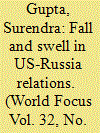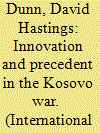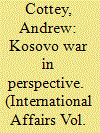| Srl | Item |
| 1 |
ID:
090780


|
|
|
|
|
| Publication |
2009.
|
| Summary/Abstract |
This article depicts that Canada did not simply offer troops in a fainthearted or half-hearted gesture to NATO, but effectively employed its resources to play an important part in the diplomacy that led to United Nations security council resolution 1244, in the maintenance of allied unity, and in operation Allied Force.
|
|
|
|
|
|
|
|
|
|
|
|
|
|
|
|
| 2 |
ID:
108206


|
|
|
| 3 |
ID:
088649


|
|
|
|
|
| Publication |
2009.
|
| Summary/Abstract |
The 1990s was a period of strategic innovation in US foreign policy. Operation Allied Force in particular represented an important step in the contorted evolution of America's attitude towards the use of force in the post-Cold War period. That operation demonstrated the growing influence of humanitarian concerns and the extent to which America was willing to reconsider Cold War criteria on the prudence and utility of force in support of its foreign policy. In its decision to intervene in Kosovo, the Clinton administration also divided opinion among the military. This, in effect, reduced the premium placed on the counsels of the armed forces and made it easier for the Bush administration subsequently to ignore their advice. Furthermore, having fought the war multilaterally through NATO, Operation Allied Force made America more wary of doing so again. In other words, the intervention set a number of precedents and left a significant legacy for the way in which US foreign policy was pursued in the decade that followed. This legacy is considered in two parts: the first analyses those issues associated with the use of force debate; the second considers how the Kosovo experience affected US attitudes to coalition warfare.
|
|
|
|
|
|
|
|
|
|
|
|
|
|
|
|
| 4 |
ID:
088641


|
|
|
|
|
| Publication |
2009.
|
| Summary/Abstract |
This article has four objectives: first to make a case for the significance of the Kosovo war in contemporary history; second, to present an overview of the crisis itself and the military confrontation which was its consequence; third, to survey the initial controversies aroused by military action-and, specifically, the debates surrounding NATO's Operation Allied Force; and finally, to reference the longer term significance of the Kosovo war in terms of the themes covered by the remaining contributions which make up this volume
|
|
|
|
|
|
|
|
|
|
|
|
|
|
|
|
| 5 |
ID:
088665


|
|
|
|
|
| Publication |
2009.
|
| Summary/Abstract |
In historical perspective, the Kosovo war stands as a significant turning point. Within the Balkan region, Operation Allied Force marked the end of the nationalist wars of the 1990s and the beginning of a new phase of partnership and integration with the EU and NATO. In terms of the wider European security order, its repercussions were contradictory. NATO reasserted its role as Europe's leading security institution, yet Operation Allied Force also gave significant momentum to the EU's development as a quasi military body. Further afield, an immediate crisis erupted in Russo-western relations followed by renewed cooperation on the ground; the longer-term impact, however, was a lingering resentment in Moscow at NATO action. At the global level, meanwhile, Operation Allied Force appeared to symbolize the primacy of both American-led western power and of the liberal norms and values that underpinned the intervention. But this was arguably a high point: future global security crises would be managed in the context of the rising power of the non-western world, a more fragmented West and greater contestation over the norms that should underpin international society.
|
|
|
|
|
|
|
|
|
|
|
|
|
|
|
|
| 6 |
ID:
080900


|
|
|
|
|
| Publication |
2008.
|
| Summary/Abstract |
This article examines Russia's response to the 1999 Kosovo crisis in order to evaluate theoretical propositions about the relationship between historical memory and conflict-causing misperceptions. For decades, Russian society consumed, especially through mass education, a particular interpretation of Russia's imperial wars and interventions in the Balkans and its historical relations with Serbia and the West. A comparison of the content of this view to the Russian elite and popular response to the 1999 Kosovo crisis shows how particularly pernicious historical ideas influenced a number of serious misperceptions about Balkan realities and Western motives in 1999. The case reveals that historical memory is more far-reaching than accounted for by traditional theories of misperception. Those theories, when they do incorporate historical memory, ignore or minimize the role of popular historical ideas as independent causes of misperceptions; perceptual distortions result largely from cognitive limitations in the processing of information, hence little can be done to avoid them. This study shows how historical ideas themselves may be a source of misperceptions. This has important policy implications: since historical beliefs are hardly immutable, efforts taken to scrutinize and challenge particularly pernicious interpretations of the past could help avoid conflict-causing perceptual distortions
|
|
|
|
|
|
|
|
|
|
|
|
|
|
|
|
| 7 |
ID:
083695


|
|
|
|
|
| Publication |
2008.
|
| Summary/Abstract |
Mark A. Wolfgram discusses the costs of early failures in the North Atlantic Treaty Organization and the United Nations mission in Kosovo after June 1999. The failure of NATO and the UN to secure basic human rights for Kosovo's non-Albanian minorities raises serious questions about the future of similar militarized humanitarian interventions.
|
|
|
|
|
|
|
|
|
|
|
|
|
|
|
|